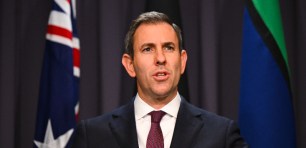
Matthew Addison, executive director of the Institute of Bookkeepers and chair of the Council of Small Business Organisations Australia. Source: Supplied.
Tax tweaks, targeted support, and red tape reduction are headline items in the Council of Small Business Association’s (COSBOA) latest pre-Budget submission, as the peak industry group prepares for what it calls the “post-COVID-19 climate”.
“Small businesses need a greater level of tailored support measures and less administrative and regulatory pressures,” COSBOA chair Matthew Addison said in the submission.
Released on Wednesday, the wish list avoids pleas for broad adjustments to the company tax rate, instead hammering on the importance of temporary full expensing and the instant asset write-off.
Temporary full expensing allows businesses with an annual turnover below $5 billion to immediately claim a tax write-off for assets used or installed by June 30, 2023.
Echoing COSBOA’s last pre-Budget submission, in which it called for an extension past mid-2023, the group says a further extension is “critical for small businesses that have ordered equipment which has been delayed by supply chain issues.”
“Without this extension, significant tax deductions will not be available which had been costed into the decision to purchase,” the submission claims.
Similarly, COSBOA wants the revival of the instant asset write-off for items worth $100,000 and below, saying the measure would slash “administrative and accounting costs for taxpayers and the Government.”
“The ongoing work of the Deregulation Taskforce should be expanded with ongoing funding for Payroll Tax alignment between the states and territories and its integration with single-touch payroll”, the group adds.
Conversely, COSBOA opposes the notion of more regular reporting under the Taxable Payments Reporting System without a deeper investigation of which businesses would be covered, and if definitions used by the system can be simplified.
Targeted financial support still needed, COSBOA says
Small businesses struggling to stay afloat should be granted financial incentives to receive professional advice, COSBOA states.
Beyond government-backed programs like the Digital Solutions Program, which subsidise cyber-advisors to provide low-cost assistance to small businesses, COSBOA says more direct kickbacks would bolster the resilience of small business.
“The consequence of businesses not seeking advice is that the range of options available to business owners to respond to their difficulties reduces significantly,” it said.
“This can lead to otherwise viable businesses needlessly struggling and can result in decisions on the future of a business being made by creditors instead of the business owner.”
In parallel, COSBOA has called on the federal government to support the next phase of its Cyber Wardens program, the digital resiliency initiative formed in partnership with Commonwealth Bank.
Outside of the digital realm, the group say the government could do more to advise small businesses which fall into disrepair with its next Budget.
One area of concern is the ‘simplified’ small business restructuring process, which insolvency and turnaround experts say is still too complex for small businesses to effectively navigate.
“COSBOA advocates for greater investment in the provision of educational resources to help small business owners understand these changes, and how to negotiate insolvency through dispute resolution processes such as mediation,” it says.
Recent discussions over payment times also earned inclusion.
“We seek consideration of a future mandating of 14 day payment times by large business within two years,” COSBOA said, reflecting on the Treasury’s recent focus on sluggish payment times between major companies and their smaller suppliers.
In the same way, the federal government should consider making the eInvoicing scheme “mandatory for large businesses in the near future after further consultation with the business sector.”
Notably, the submission avoids direct reference to support for small businesses which will eventually be exposed to multi-employer bargaining through the passage of the Secure Jobs, Better Pay bill.
Budget submission contains broad policy wish list
A broad swathe of other policy suggestions populate the submission, pointing to COSBOA’s broad policy agenda for 2023.
Adding resources to the Fair Work Commission specific to small business education will drive their alignment with best practices, COSBOA says, while calling for tools and explanations targeted towards Indigenous Australian entrepreneurs, and those from culturally and linguistically diverse backgrounds.
Without airing the same concerns over casual worker definitions previously levelled by fellow industry groups, COSBOA is seeking “recognition” that casual employees receive extra loadings in lieu of entitlements like sick leave and paid time off.
On the leave front, COSBOA hopes Australia’s new paid domestic violence leave scheme will eventually be funded by the federal government, noting the scheme is up for independent review after 12 months.
And COSBOA, whose member organisations represent countless retailers across Australia, has formally voiced its support for buy now, pay later services being covered by the Credit Act and responsible lending obligations.
You can read the full submission here.
Handpicked for you

ASIC’s $1.5 billion business registry overhaul now under review after cost blowouts and major delays



COMMENTS
SmartCompany is committed to hosting lively discussions. Help us keep the conversation useful, interesting and welcoming. We aim to publish comments quickly in the interest of promoting robust conversation, but we’re a small team and we deploy filters to protect against legal risk. Occasionally your comment may be held up while it is being reviewed, but we’re working as fast as we can to keep the conversation rolling.
The SmartCompany comment section is members-only content. Please subscribe to leave a comment.
The SmartCompany comment section is members-only content. Please login to leave a comment.